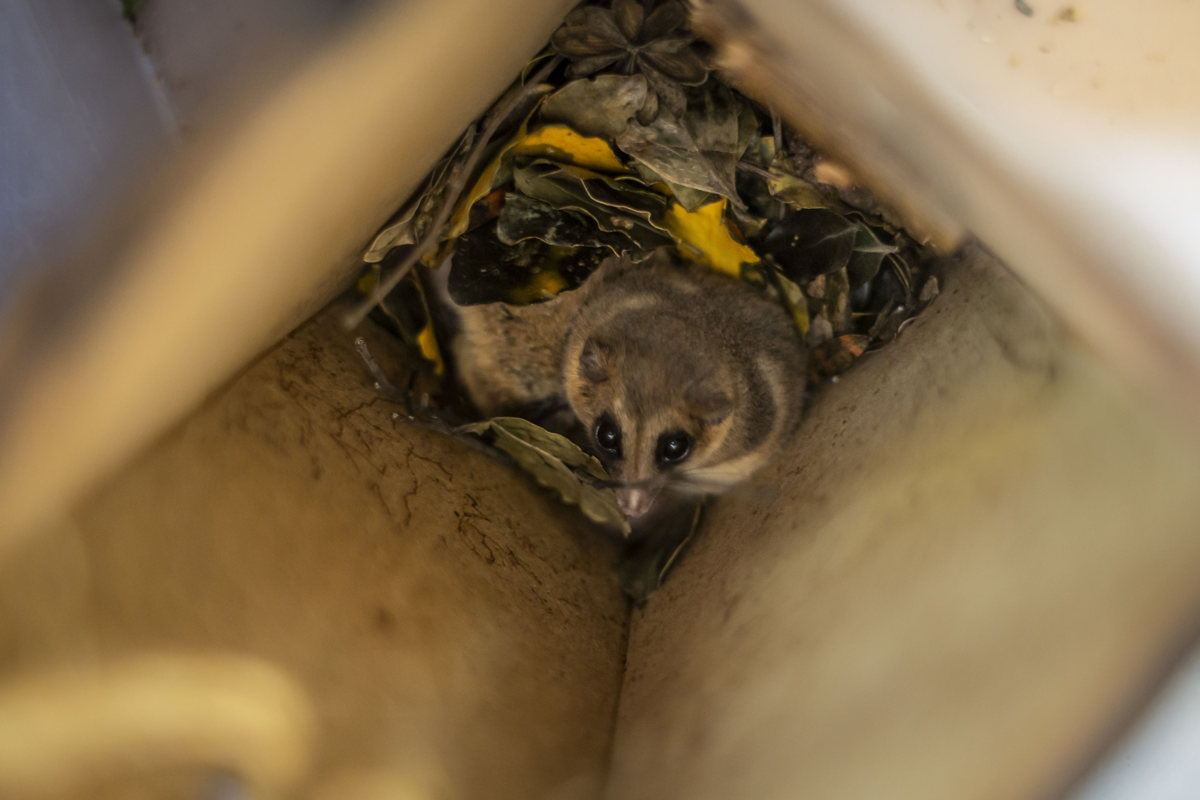Release of Monitos del Monte on the UdeC Campus Naturaleza Project Land

Two specimens of Monito del Monte (Dromiciops gliroides), from the Wildlife Rehabilitation Center of the University of Concepción in Chillán, were released into the remnants of native forest that are part of the University of Concepción’s Campus Naturaleza project. This is the first of several similar activities to be conducted in collaboration with the Agricultural and Livestock Service (SAG), aiming to expand the habitat for various endemic fauna species in the area.
There were many ashes and embers. At first, we thought it was a mouse, but then we realized it was a Monito del Monte. We called SAG, and they gave us instructions on how to care for it until they arrived. Now they invited me to the release, and it is exciting to be part of this,” said Mauricio Nahuelquin. He recounted that they were cleaning up the Poñen area (Florida) after the February wildfires when they found a monito del monte (Dromiciops gliroides)starting a chain of events that ended with the marsupial being welcomed into its new home on the University of Concepción’s Campus Naturaleza project land.
This specimen, along with another from Chiguayante, spent 10 months under the care of the Wildlife Rehabilitation Center of the University of Concepción in Chillán. They are now part of a groundbreaking initiative at the national level. Through this project, the university will conserve 25 hectares of relict forests and aquatic ecosystems, and carry out nature conservation actions, ecological restoration, human well-being, and integrated health, among other facets.
Dr. Cristian Echeverría L, Director of the UdeC Campus Naturaleza Project, comments that this activity "confirms the university's commitment to ensuring long-term biodiversity protection while expanding habitat areas for various species. All of this is approached from an interdisciplinary perspective and involves multiple faculties committed to biodiversity protection and its connection to human well-being."
"The Campus Naturaleza project is seen as a place that will ensure the continuity of certain species in the future," adds Dr. Cristian Echeverría L. "This is a space that safeguards local biodiversity, where it is possible to receive fauna affected by various anthropogenic factors such as fires or habitat destruction. This is the first of several releases aimed at expanding habitat so that different species can develop, disperse, and reproduce within the project's action lines, immersed in areas containing the last remnants of what was once the Bosque Caducifolio de Concepción"an ecosystem transitioning between species found in the central and southern regions of the country. For this reason, its characteristics are unique and not found elsewhere," he emphasizes.
From Chillán
Dr. Paula Aravena B., Veterinary Doctor and Director of the Wildlife Rehabilitation Center of the University of Concepción in Chillán, expresses that "these specimens of monito del montewere victims of the latest forest fires, where they suffered smoke inhalation and burns on their skin. We have a female specimen that entered our center on February 4 from Florida, and a male specimen that entered from Chiguayante shortly after."

She adds that their role in the native forest is crucial. "They play a very significant ecological role in fertilizing the native forest, as they consume seeds and defecate them intact, unlike rodents that often break them down. Here, they ingest the seeds, leaving behind feces that enhance the seeds' ability to germinate compared to seeds left alone in the natural environment."
Additionally, they" monitos del monte move within a home range of approximately one square kilometer; during this movement, they spread native forest seeds to different locations within that territory"
"Forest fires cause them to inhale carbon monoxide, which occupies the space in the body where oxygen-carrying molecules should be. As a result, the animal begins to lose the amount of lung oxygen and becomes intoxicated, leading to death. It's very difficult to remedy this, especially considering they are very small specimens, weighing around 30 grams; the male, when he arrived, weighed only 10 grams. Therefore, guiding a patient of this size towards recovery and ensuring their health is challenging"
"Subsequently, various dietary adjustments must be made for them to acclimate to their new ecosystem, which in this case is an area protected by the university itself. It's a healthy space where there are also other specimens, abundant food exists, which will enable them to have a good life in the future," adds the specialist".
In another context, the Regional Director of the Agricultural and Livestock Service (SAG), Roberto Ferrada, points out that "it is very satisfying to be here, a couple of blocks from downtown Concepción, releasing these specimens after 10 months of recovery, reintegrating them into their environment. In addition, we want to acknowledge the tremendous work done by the staff of this center and also by Mauricio, who reported this female affected by the forest fires last February. Once again, we see the result of collaborative work between the community represented today by Mauricio, who provided timely notice to SAG, allowing for their transfer to the Rescue Center, which enables us to share this good news with the community."
Regarding forest fires that could affect the region during the summer season, the SAG director reminded that "when forest fires occur, animals flee the area seeking refuge, relocating naturally. If we find specimens escaping, we must let them continue their path. In cases where they are injured or burned, we must intervene as they require our assistance. Therefore, we request reporting to SAG to coordinate their rescue or direct transfer to authorized centers for timely care," stated the director.
The Monito del Monte is protected under the Hunting Law and classified as a beneficial species for silvoagricultural activities. Both specimens will live on the grounds of the University of Concepción's Campus Naturaleza project, where there are native ecosystems and suitable habitats for their development.


